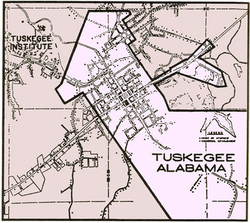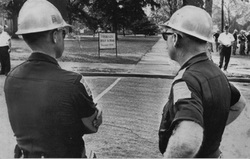Macon Law
Laws Governing Macon County

This is a list of the laws and ordinances governing the citizens of Macon County, Alabama.
These are the bills introduced by members of the Alabama State Legislature on behalf of Macon County that have become the Ammendments to the Alabama Constitution: Elimination of Macon County Macon Co. Board of Education Election Bingo Gaming Tuskegee Foreign Trade Investment Zone Allow County Commission to Tax Tobacco and Alcoholic products Macon Co. Board of Education Composition Macon County Employers Retirement System Gomillion vs. Lightfoote

Alabama, 1957. The State Legislature redraws the city of Tuskegee. It had been a square; now the city is a strangely shaped twenty-eight-sided polygon. There had been 400 black voters in Tuskegee. Now there are five. Yet not one white voter is lost by Tuskegee's new borders. The city's former black citizens believe they've been cut out of their constitutional rights. A unanimous Supreme Court agrees. "The Fifteenth Amendment forbids a State from passing any law which deprives a citizen of his vote because of his race." Justice Frankfurter writes: "When a State exercises power wholly within the domain of state interest, it is insulated from federal judicial review. But such insulation is not carried over when state power is used as an instrument for circumventing a federally protected right."
Lee vs. Macon Co. Board of Education

Lee v. Macon County Board of Education (1964) concerns the first statewide desegregation ruling in the United States. In this ruling, a federal district court first enjoined the state board of education and the governor of Alabama from interfering in desegregation efforts and later ordered the desegregation of all of Alabama's 118 school districts. This entry covers the background, the facts, and the aftermath of the Lee v. Macon County Board of Education ruling. It has been said that no other Supreme Court decision has affected so deeply and so immediately the daily lives and emotions of so many U.S. citizens as did the striking down of school segregation in Brown v. Board of Education. Within weeks of the declaration by the United States Supreme Court in that case that racial segregation of public schools was illegal and unconstitutional, a White Southern resistance movement emerged. (written by M. Elizabeth Kirkland)
|
|
